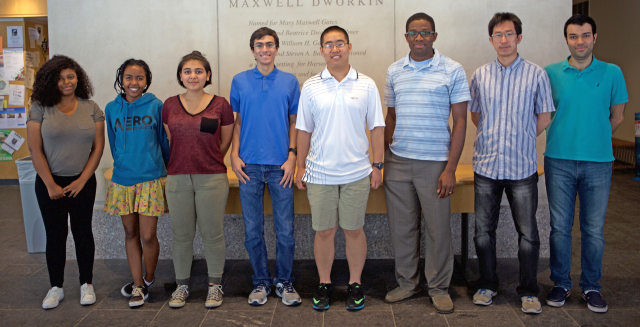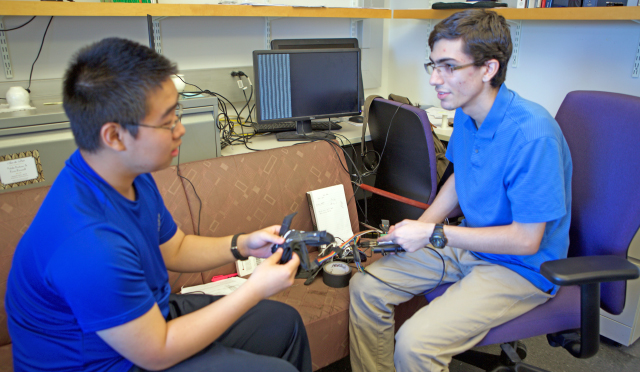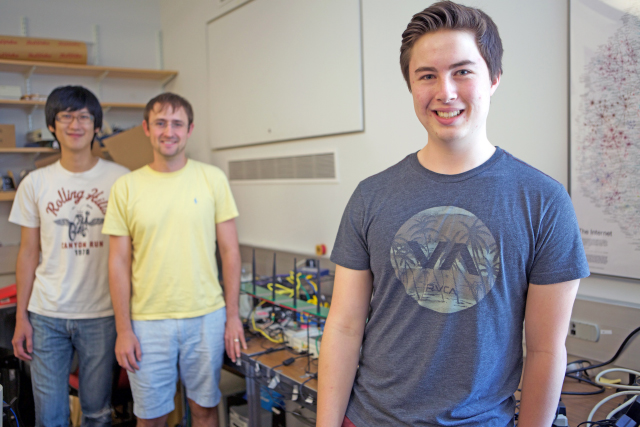News
High school students Eden Abebe and Yordanos Tesfaye fine-tune the sensory gloves they created in the Tarokh Lab this summer. (Photo by Adam Zewe/SEAS Communications.)
For many high schoolers, summer jobs involve mowing grass or scooping ice cream. But a group of local students had decidedly less mundane workdays. They spent their summer at the Harvard John A. Paulson School of Engineering and Applied Sciences (SEAS) where they implemented an algorithm to build an evolutionary tree for bacteria, conducted time-series analysis of fluctuations in gold prices, and built sensory gloves to gather data on grasping motions.
Six high school students worked on those projects in the lab of Vahid Tarokh, Perkins Professor of Applied Mathematics and Vinton Hayes Senior Research Fellow of Electrical Engineering. Postdoctoral fellows Chinwendu Enyioha, Shahin Shahrampour, and Yu Xiang supervised the high schoolers. Students Yordanos Tesfaye, Eden Abebe, Paloma Ortiz, Joseph Farah, Jianheng Zhang, and Sophie Lipkin participated in the summer program in the Tarokh lab, which was sponsored by a grant from the U.S. Army.

High school students Yordanos Tesfaye, Eden Abebe, Paloma Ortiz, Joseph Farah, and Jianheng Zhang with postdoctoral fellows Chinwendu Enyioha, Shahin Shahrampour, and Yu Xiang (not pictured, high school student Sophie Lipkin). (Photo by Adam Zewe/SEAS Communications.)
The sensory gloves are important for the lab’s robotics research; they will be used to generate a database of stable grasping motions that could enable robots to perform intricate tasks more effectively, Enyioha explained.
For Yordanos Tesfaye, 17, a rising senior at Cambridge Rindge & Latin School, troubleshooting problems with the glove sensors was challenging, but it was rewarding to work on a project with a real-world application.
“When we first saw a sample glove, we never thought we’d be able to create one ourselves,” she said. “It has been fun to see it come together. Everything we are doing is new to us, and we’ve had to learn new skills along the way.”
Enyioha and his colleagues coached the high school students through a number of complex lessons, from a Matlab programming tutorial to a detailed explanation of applied probability.

Rising high school seniors Jianheng Zhang (left) and Joseph Farah run tests on their sensory gloves. (Photo by Adam Zewe/SEAS Communications.)
The summer project was also a learning experience for the postdoctoral fellows, who mentored students as they tackled each project and broke down advanced concepts so they could gain the necessary knowledge to move forward. Enyioha said he and his colleagues were impressed by how the students rose to each challenge.
“If the students can leave with an appreciation and sustain their interest in the sciences, then we will feel that we’ve made a contribution,” he said. “These three different projects are designed to give them a flavor of what is available down the line.”
In the lab of H.T. Kung, William H. Gates Professor of Computer Science and Electrical Engineering, Alex Iansiti also got a taste of what research is like. He took on several different projects focused on the movement of waves between antennas.
Working with postdoctoral fellows Kevin Chen and Michael Crouse, Iansiti developed equipment that could conduct angle of arrival estimation experiments inside a building. In the SEAS Active Learning Labs, he used a 3D printer to create a plastic base to hold an antenna, and then attached it to a servo motor. The simple device was able to show how moving or shaking an antenna affected the data.
“The biggest lesson I learned this summer is that research is fun,” said Iansiti, 17, a rising senior at Milton Academy. “The work I’ve done here is much more open-ended. I’ve had to read the literature, come up with my own conclusions, and then work with what I’ve been able to figure out.”

High school student Alex Iansiti with postdoctoral fellows Kevin Chen and Michael Crouse. (Photo by Adam Zewe/SEAS Communications.)
The enthusiasm and creativity Iansiti brought to the lab provided a fresh perspective for Chen and Crouse. Considering new approaches and encouraging outside-the-box thinking are critical to conducting effective research, Crouse said. Working with Alex has also helped the pair learn to be better mentors.
“I believe that you only really know something when you are able to teach it to someone else,” Crouse said. “Having students in the lab brings in a level of excitement and fun, but it also provides novel ideas that can have a real impact on our research.”
Cutting-edge science delivered direct to your inbox.
Join the Harvard SEAS mailing list.
Scientist Profiles
H.T. Kung
William H. Gates Professor of Computer Science and Electrical Engineering and Vinton Hayes Senior Research Fellow in Electrical Engineering
Press Contact
Adam Zewe | 617-496-5878 | azewe@seas.harvard.edu

